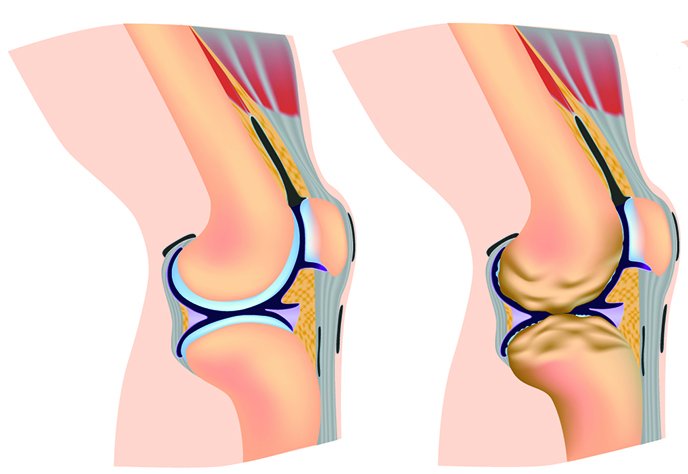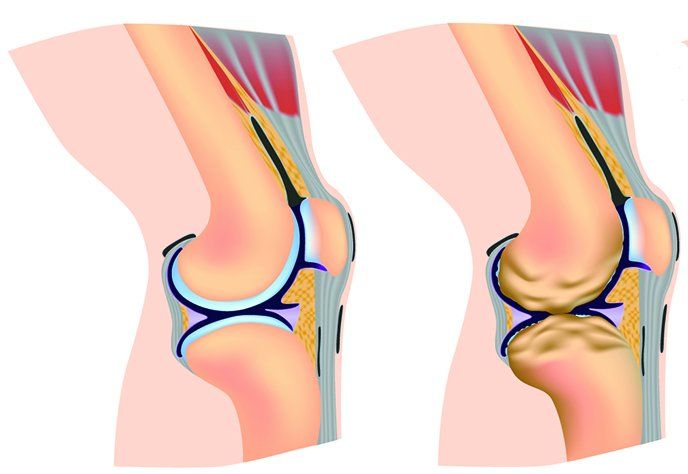What’s good for your heart might also be good for your aching knees. High intakes of saturated fat were associated with a faster progression of knee osteoarthritis in a new prospective observational study, while consuming more heart-healthy unsaturated fats was linked to slower progression.
“Following a healthy diet may be an effective strategy for knee osteoarthritis management, and is clearly more attractive than medications in terms of risk/benefit and more likely to be implementable,” wrote researchers, who included Jeffrey B. Driban, PhD, and Timothy E. McAlindon, MD, both of the Division of Rheumatology at Tufts Medical Center.
“We observed significant associations of dietary fat with structural progression of knee osteoarthritis. Higher total dietary fat or saturated fat intake was associated with increased radiographic progression of knee osteoarthritis, and higher polyunsaturated fat and monounsaturated fat intakes appeared to be associated with reduced progression.”
Dreamstime.com

FAT CHANCES: The study, published in Arthritis Care & Research, looked at data on 2,092 participants in the Osteoarthritis Initiative whose knees were imaged and who completed food-frequency questionnaires. Progression of the disease over up to four years was measured by changes in joint space width in the knees.
Even after adjusting for body-mass index (BMI) and other potential confounders, the type of fat consumption was associated with joint space width changes and osteoarthritis progression, both negatively and positively. Those in the one-quarter of participants reporting the most saturated-fat intake were at 60% greater risk of osteoarthritis progression than those consuming the least. Total fat intake was also associated with worsening joint space width, but the association with a whole-joint assessment of osteoarthritis progression was not significant.
On the other hand, higher intake of unsaturated fats – especially the polyunsaturated fats found in liquid vegetable oils, avocados, nuts and fish – was associated with less joint space width loss and lower risk of progression. Those in the highest one-quarter of polyunsaturated fat consumption were at 30% lower risk of osteoarthritis progression than those consuming the least.
INFLAMMATION FIGHTER: Why might unsaturated fats help protect against worsening of osteoarthritis? Researchers explained, “There is consistent evidence that polyunsaturated fatty acids have anti-inflammatory effects via their role as precursors for a family of compounds known as eicosanoids. Eicosanoids are mediators and regulators of inflammation.”
Dreamstime.com

They added, “The pathophysiology of osteoarthritis is now recognized to involve much more than simple mechanical ‘wear and tear’ of articular cartilage” (the smooth, white tissue that covers the ends of bones where they come together to form joints).
As an observational study, the findings can’t prove cause and effect. Researchers noted limitations including the self-reporting of dietary fat intake and the complex interactions between diet, obesity, weight gain and osteoarthritis outcomes.
Nonetheless, the results offer hope for osteoarthritis patients looking for steps they can take to limit the progression of the disease. And since the findings about fat choices and osteoarthritis mirror those already known to help protect your heart and improve glucose and insulin, there’s no downside to making these smart substitutions.
TO LEARN MORE: Arthritis Care & Research, July 2016—
http://dx.doi.org/10.1002/acr.22952
You can help protect your heart – and possibly slow the progression of osteoarthritis – by switching from saturated fats to polyunsaturated and monounsaturated fats. Don’t try simply adding unsaturated fats to your diet; instead, substitute foods with unsaturated fats for sources of saturated fat such as butter, palm and palm kernel oils, stick margarine, fatty meats, processed meats, pizza and baked goods, and for refined grains, starches, and sugars. Some options recommended by Tufts experts:
– Use vegetable oil-based dressings and spreads on foods and in cooking instead of butter or lard.
– Eat plenty of nuts, seeds and fish, which are rich in healthy unsaturated fats and other nutrients.
– Choose extra virgin olive oil, soybean oil or canola oil for dressing, sauces and cooking.
– Reduce intakes of red and processed meats, and foods rich in refined grains, starches and sugars.
























